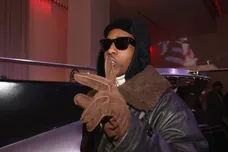There has been no artist in our culture that has had a more storied four years than The Weeknd. The Scarborough, Canada native currently sits in a pop music position that he probably never had imagined himself in. When House Of Balloons dropped in March of 2011, no one knew who or what The Weeknd was. He was, literally, a faceless voice that made music about the raw realities of being a young man growing up in a small, drug-driven, lust-crazed environment. Clearly, the music spoke loudly enough for itself and it wasn't really until his first live performance in the summer of 2011 where people actually saw the man behind the music.
Fast forward four years, two more mixtapes, one studio album, a handful of features, a couple tours and a co-sign from some of music's biggest artists and here we are at studio album number two; Beauty Behind the Madness. Even for The Weeknd, who seemed to have a firm stance on his dealings with fame, four years has brought a ton of change to the man and his music.
Beauty Behind the Madness is essentially The Weeknd's acceptance of stardom. Throughout his mixtape series and even a little on his last album, you can hear and feel his resilience to the bigger pop world. The beats were extremely moody and the lyrics were uncensored to say the least. However for this album, the overall theme is more grandiose and seems catered to a larger audience instead of his usual listenership-- people who need a soundtrack for their afterhours comedowns. Not to mention the handful of interviews and press he has done for the album's rollout. That exact same openness shows in the music.
The album starts with "Real Life" which, after a few listens, seems like suitable opener. He talks about his past mistakes and balancing the real him vs. the mega-star people want him to be. All of which is sung over a violin infuzed electric riff that hits equally as hard as his vocals. The album then spills into "Losers" which is actually one of the album's most honest. Getting the assist from UK singer/songwriter Labrinth, The Weeknd basically discredits the school system; literally. The opening line, "Only losers go to school," is said with such a convincing cadence that it might just make you contemplate dropping out. As silly as this might sound, The Weeknd actually makes a fairly reasonable case for self-education and "teaching yourself how to move." Primarily because he was a high school dropout himself, but also because being self-aware is something that can't be taught.
The album then moves to "Tell Your Friends" which will be a fan-favorite for two reasons. First of all, it is produced by Kanye West so obviously the musicality is flawless and the replay value is through the roof. Secondly, this is one of the only tracks on the album that has The Weeknd talking like he's back in 2011. During The Weeknd's mixtape run it seemed as if he had no filter. It isn't like his music is ready to be the soundtrack for a Disney movie anytime soon, but recently his songwriting and choice of words have moved on from over-the-top explicit. On this particular track however, he gets back to the basics. Lines like "some dope dimes on some coke lines" and "don't believe the rumors bitch I'm still a user" remind us that no matter what heights of fame The Weeknd might attain, he is still that reckless teen from Toronto's east end.
Even though criticized for placing previously released songs on the album, "Often," "Earned It," "The Hills" and "Can't Feel My Face" give the album a ton of energy; the latter obviously being a contender for song of the summer. With these "singles" he is able to sound like himself in an uncompromising way. Sure, "Can't Feel My Face" sounds like an attempt at mainstream radio play but keep in mind that the song is still about women and cocaine binges-- so it really isn't that much of a reach.
The album then slows down a bit. "Shameless" seems like the token acoustic guitar ballad that is trying to recreate "Wicked Games," whereas "As You Are" totally gets lost in the shuffle. It isn't until "In The Night" where the album picks back up. If you were unsure about the Michael Jackson comparisons, this song is your answer. Maybe it's the "Way You Make Me Feel" baseline or the sharp "Billie Jean"-esque vocal range but on this track you can tell that The Weeknd is no longer shying away from his MJ comparisons, but instead using them to his advantage.
The Ed Sheeran collaboration on "Dark Times" looks good on paper but seems strange when it hits your hears. The concept for the song fits the album but in all honesty, it would have felt more authentic sans Sheeran. On the other hand, the inevitable Lana Del Rey collaboration fits perfectly. As they glide through "Prisoner" it sounds like they are the "you" eachother sing about on almost every song. Their moody yet harmonizing stylings compliment each other almost seamlessly.
By the end of the 65 minutes that makes up Beauty Behind the Madness, you can see why The Weeknd chose to make this album the way he did. He is not the same person he was in 2011, and the music will always reflect that. He is currently at breaking point where he must decide which way he wants to take his career. After hearing this album in full, you can tell that he is aiming for R&B music supremacy. The album proves just how much The Weeknd is willing to evolve without losing any of the dark, raw and unique foundations his sound was built on. So whether it's Top 40 radio in the morning or an intimate playlist at half past 5:00, The Weeknd's latest is a must-play.
Stream Beauty Behind the Madness here.









